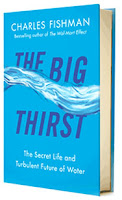Articles and books that describe our current and future water issues are becoming as ubiquitous as water itself. With articles like; “Drinking Sewage in Texas” on the cover of Discover and constant coverage of the local hydro-fracking debate, Charles Fishman's latest book, The Big Thirst, is a timely review of our current and historical relationship with water in the US and around the world. An overriding question permeates the book: is clean water a human right? Questions of water ownership are explored ( these seem particularly relevant to our local water struggles). He focuses on individual, corporate, and agricultural water use, citing Barcelona's need for water freighters; Bridgeport , Alabama's fire truck water service; Australian cities working to help each other: one with excess water that needed to be disposed of and another that needs vast amount of (not necessarily drinkable) water to wash wool; India's continued struggle with 24/7 water availability; and other water "situations".
He addressed the “yuck factor” of recycling water head on, and describes how communities around the world have dealt with the politics of water. Examples of people in the United States and around the world, prove that people can work together to find solutions to varied water struggles, enabling all people to have their need for clean water met.
His ending remark rings true, “ Everything about water is about to change—except, of course, water itself.” Just as the Earth will survive while its inhabitant will be impacted by climate change, so too, will water remain the same; humanity will change. Rather that writing a discouraging view of our water crisis, he demonstrates that there are great opportunities to impact our water future, if we focus on the reality of the situation and put the technology that is already available towards simple, often local, solutions.
He addressed the “yuck factor” of recycling water head on, and describes how communities around the world have dealt with the politics of water. Examples of people in the United States and around the world, prove that people can work together to find solutions to varied water struggles, enabling all people to have their need for clean water met.
His ending remark rings true, “ Everything about water is about to change—except, of course, water itself.” Just as the Earth will survive while its inhabitant will be impacted by climate change, so too, will water remain the same; humanity will change. Rather that writing a discouraging view of our water crisis, he demonstrates that there are great opportunities to impact our water future, if we focus on the reality of the situation and put the technology that is already available towards simple, often local, solutions.




